Key takeaways:
- Cannabis edibles laws vary by region, emphasizing the need for consumers to verify compliance and safety standards.
- Local regulations not only protect consumers but also support community economies and local businesses.
- Engaging with local cannabis communities enhances understanding of legislation and fosters support systems.
- Documenting personal experiences and attending community discussions can help individuals advocate for clearer cannabis laws.
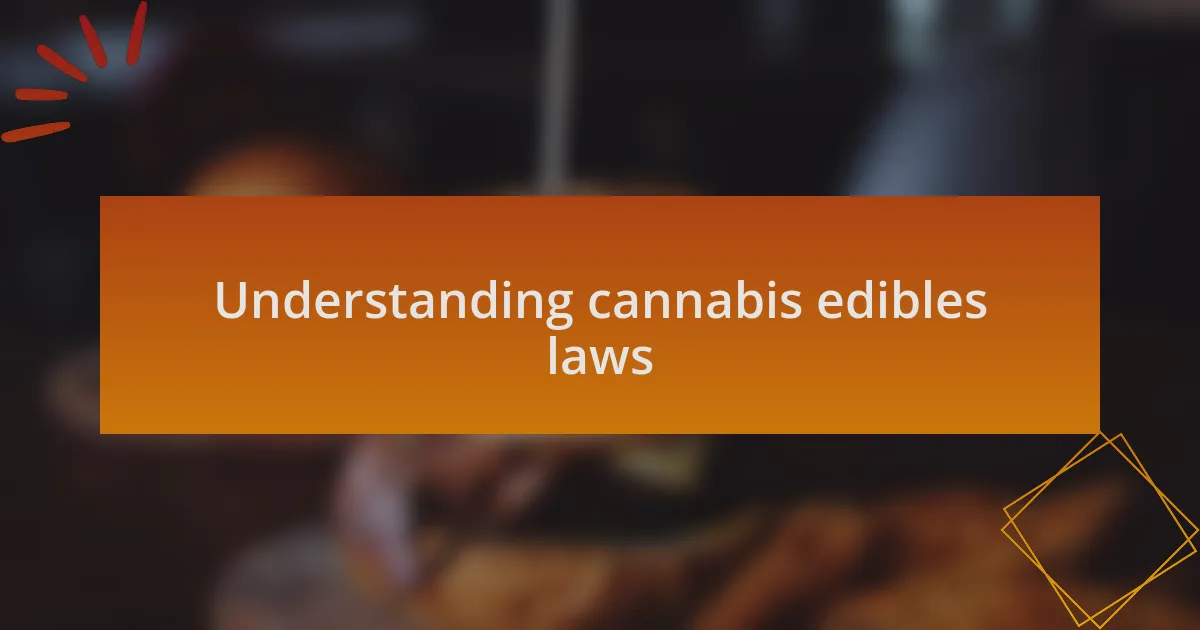
Understanding cannabis edibles laws
When it comes to understanding cannabis edibles laws, it can feel overwhelming. I remember diving deep into my local regulations, feeling a mix of excitement and confusion. The rules seem to vary significantly from one place to another, and I often wondered: How do you navigate this maze without losing your mind?
Initially, I was surprised to discover that many states have strict guidelines on dosage and packaging for edibles. These laws are designed to protect consumers, but they can also leave you guessing about what products are truly compliant. Have you ever stumbled upon an edible that looked enticing, only to question whether it was lawfully produced? That moment of doubt can be frustrating yet serves as a reminder of the importance of verifying legal standards.
As I continued to explore these laws, I found that some regions allow homemade edibles while others strictly prohibit them. This disparity really struck me. Is it fair that one area embraces personal creativity in cannabis consumption while another enforces limitations? Understanding these nuances is crucial for anyone considering indulging in edibles, ensuring not just safety but also compliance with local laws.
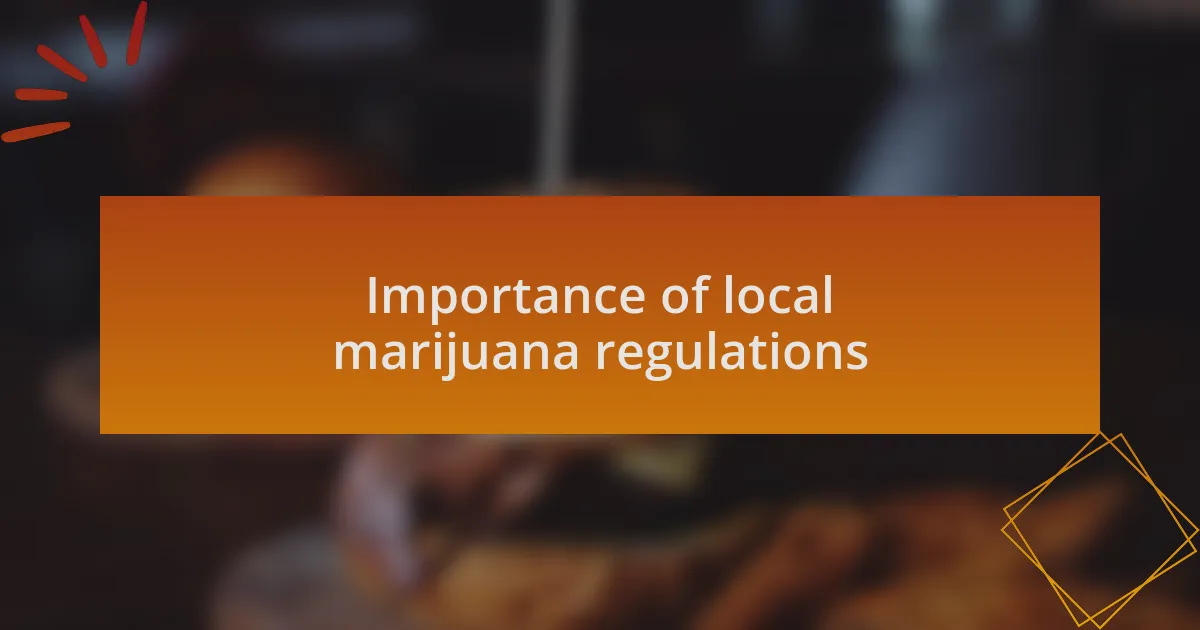
Importance of local marijuana regulations
Navigating the landscape of local marijuana regulations is essential for anyone interested in cannabis edibles. I vividly recall my first encounter with a beautifully packaged edible that promised a perfect evening, only to realize later that it didn’t meet my state’s legal requirements. It was a wake-up call—I quickly learned that local laws not only influence what I can safely consume but also ensure that the products are tested for quality and safety.
In my experience, regulations serve as a protective barrier against unregulated products that can lead to negative experiences. I remember a friend who once tried an unregulated edible from an out-of-state vendor. The dosage was way off, resulting in a rather alarming experience. This incident highlighted how crucial it is to stay informed about local regulations, as they can directly impact our well-being and enjoyment of cannabis edibles.
Moreover, local regulations play a vital role in supporting community economies and local businesses. I have witnessed firsthand how compliant businesses thrive while those cutting corners often struggle to stay afloat. So, when I think about the importance of these laws, it’s more than just about what’s on my plate; it’s about fostering an environment where both consumers and businesses can prosper safely and responsibly.
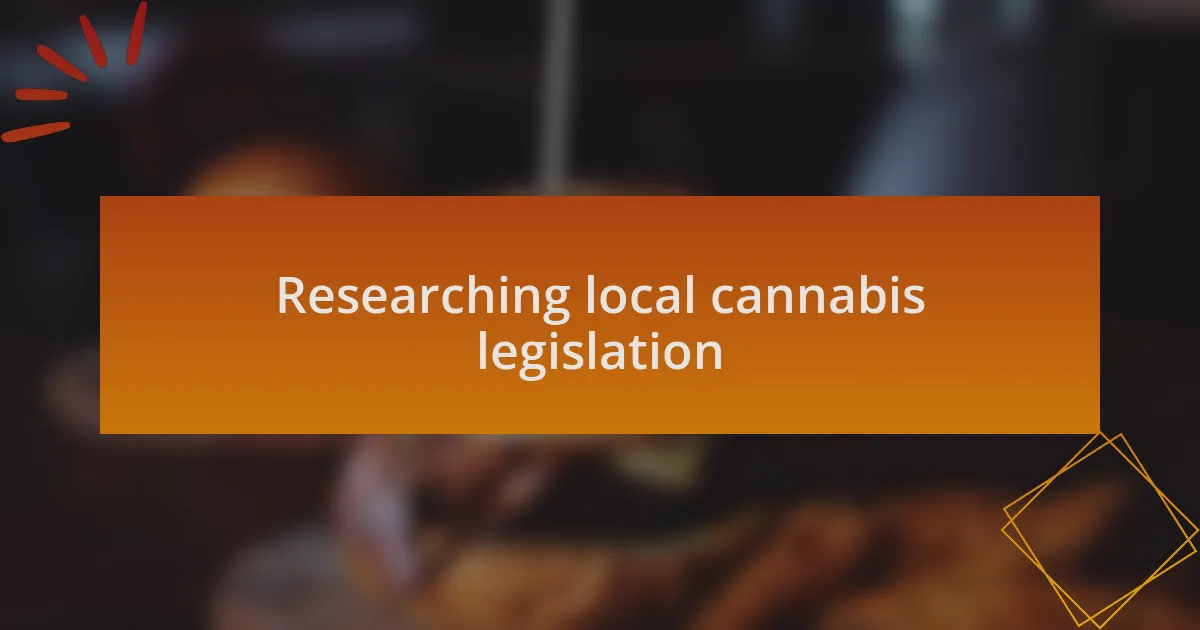
Researching local cannabis legislation
Researching local cannabis legislation can seem overwhelming at first, but it really boils down to knowing where to look. I remember pouring over the regulations on my state’s website, feeling a mix of curiosity and apprehension. It was eye-opening to realize the vast differences in laws across various states and municipalities—some areas were more progressive, while others remained restrictive.
One effective strategy I found helpful was reaching out to local cannabis communities, whether online or in person. I joined forums and attended meet-up events, which provided a wealth of shared knowledge and real-life experiences. Hearing stories from others who had navigated the same regulations enhanced my understanding and helped me uncover nuances I might have missed on my own.
It’s not just about reading the laws; it’s about grasping how they affect your everyday choices. When I finally understood the legal limits on dosage and sales, it gave me a sense of empowerment. I now approach purchasing edibles with confidence, knowing that I’ve done my due diligence to enjoy them safely and responsibly.
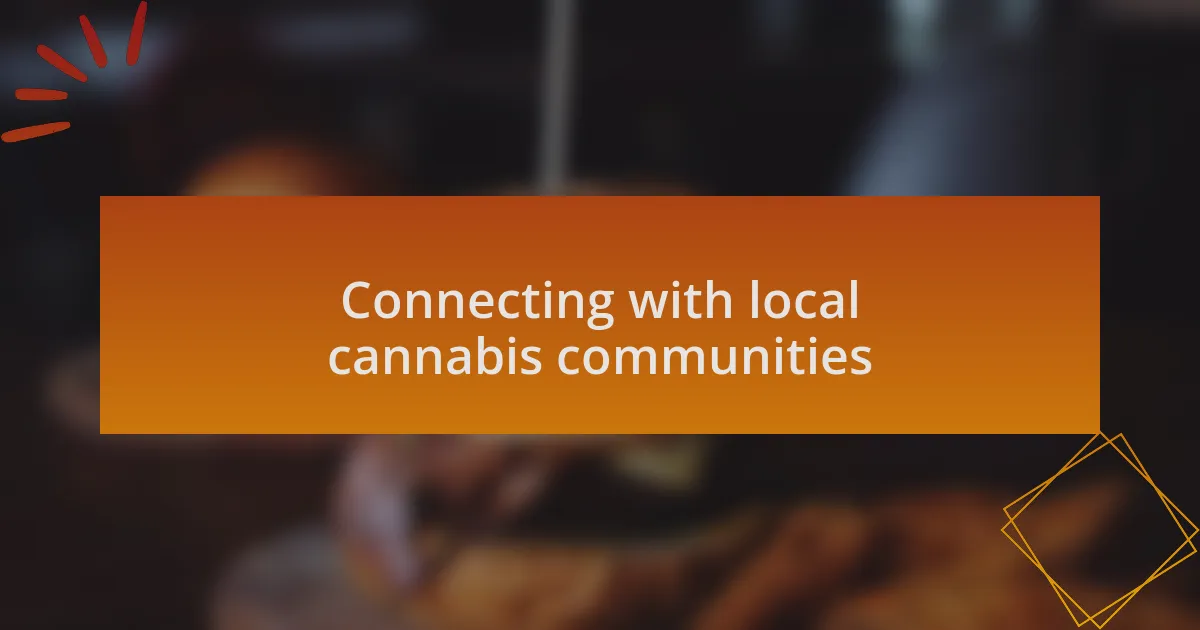
Connecting with local cannabis communities
Connecting with local cannabis communities has been an invaluable part of my journey. I remember the first time I wandered into a local cannabis club, feeling a mix of excitement and nervousness. The welcoming atmosphere and open discussions about strains, consumption methods, and, crucially, local laws made me feel at home among fellow enthusiasts.
Being part of these communities allowed me to share and receive practical advice that I couldn’t find online. I once attended a workshop on cannabis cooking that not only sharpened my skills but also connected me with people who had faced similar legal challenges. Listening to their insights made me realize how important it is to foster these connections; they serve as a support system that immensely enriches the learning experience.
Engaging with local cannabis advocates opened my eyes to advocacy efforts and community events that I didn’t know existed. It’s inspiring to witness firsthand how passionate individuals are working to change perceptions and laws. Have you ever found yourself in a space where you felt a genuine connection to a movement? That’s how I felt, and it ignited a desire in me to become more involved in the local cannabis landscape.
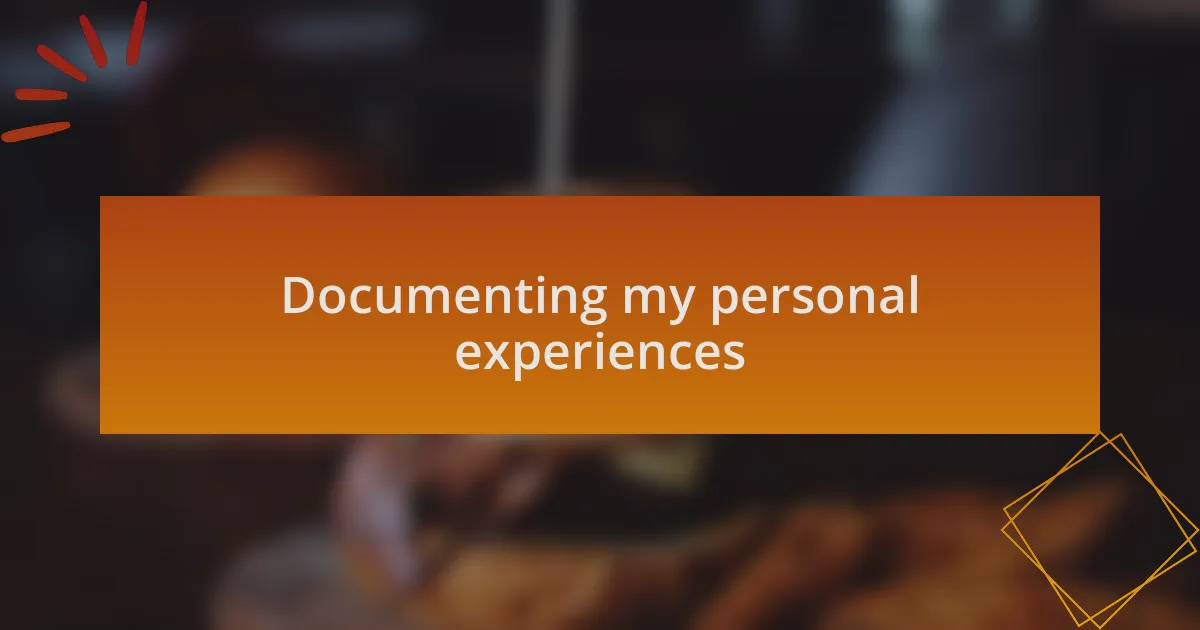
Documenting my personal experiences
Documenting my experiences navigating local marijuana laws has been a journey filled with both challenges and victories. One particular instance stands out: after facing a confusing legal situation about edibles, I spent hours researching regulations online. I remember feeling overwhelmed by the sheer volume of information, but that effort ultimately helped me clarify what was permissible in my area.
Attending local government hearings was eye-opening for me. I still recall the palpable tension in the room as community members voiced their concerns and hopes regarding cannabis legislation. Watching passionate speakers advocate for change inspired me deeply; it made me realize that every voice matters in shaping these laws. Have you ever felt a surge of motivation from witnessing advocacy in action? For me, it was a turning point, encouraging me to document not just my findings but my feelings throughout this process.
I’ve often turned to my journal to record personal reflections on how local laws impact individual lives. One entry highlights a conversation with a friend who faced legal repercussions for home growing. Listening to his story made me acutely aware of the emotional toll that strict regulations can impose. It reinforced my belief that sharing these personal stories is crucial—they humanize the numbers and legal jargon we often encounter when discussing cannabis regulations.
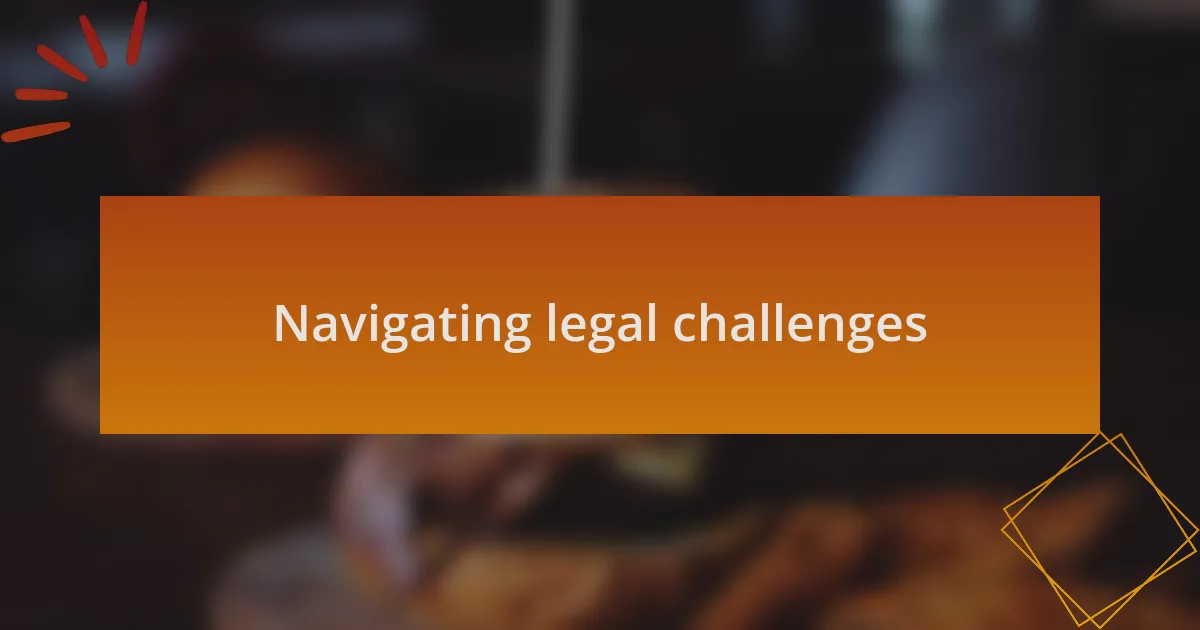
Navigating legal challenges
Navigating legal challenges regarding local marijuana laws can feel like an endless maze. I vividly remember attending a local forum where a heated discussion unfolded about the legality of edibles. As I listened to the different perspectives, I wondered: how do we find common ground in such a divisive topic? That experience taught me the importance of patience and understanding as we work through these complex issues.
In another instance, I found myself at a local dispensary’s community meeting, where I learned about the intricate zoning laws affecting cannabis businesses. I was struck by how these regulations could either uplift or hinder local entrepreneurs. It made me think about the broader implications of these laws—who truly benefits from them? Seeing the passion and frustration on the faces of small business owners reinforced my belief that we must actively engage with these legal challenges, as they’re woven into the fabric of our community’s future.
I can’t help but reflect on the anxiety that comes with uncertainty in this evolving landscape. A friend of mine faced legal hurdles after launching her line of edibles, and she shared with me her sleepless nights filled with worry. Her journey reminded me of the stakes involved in navigating these laws, pushing me to advocate for clarity and compassion in our approach to cannabis regulations. Isn’t it crucial that we strip away the fear and start having honest conversations about these changes?